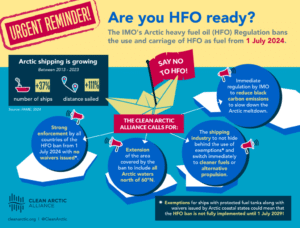Arctic Heavy Fuel Oil Ban Arctic States Must Drop Climate-Warming Loopholes
Understanding the Impact of the July 1st Heavy Fuel Oil Ban in the Arctic

July 1, 2024: Today marks the implementation of the International Maritime Organization (IMO) ban on the use and carriage of heavy fuel oil (HFO) by Arctic shipping. The Clean Arctic Alliance is calling on IMO member states, especially those with Arctic coastlines, to enforce this ban rigorously and without exploiting loopholes.
Call for Comprehensive Action: The Clean Arctic Alliance urges the IMO to expand the ban to cover all Arctic waters north of 60°N and to implement regulations that reduce black carbon emissions from shipping. Studies by the Arctic Council indicate a 37% increase in ship activity and a 111% rise in the total distance traveled in the Arctic from 2013 to 2023. This uptick underscores the urgent need for stricter environmental measures.
Recent Enforcement and Challenges: A recent incident involving the Irish vessel Arklow Wind, which was fined in Svalbard for carrying HFO, highlights the ongoing enforcement challenges. Despite the 2022 ban on HFO in Norwegian waters around Svalbard, many vessels continue to operate under exemptions and waivers. As a result, only about 26% of Arctic shipping will be affected by the ban until it is fully enforced in 2029.
Black Carbon and Climate Impact: Black carbon, identified by the IMO as the second-largest source of ship climate warming, contributes to around 20% of shipping’s climate impact over a 20-year period. The deposition of black carbon on snow and ice accelerates melting and reduces the albedo effect, exacerbating global warming. The current IMO ban, agreed upon in June 2021, has been criticized for its significant loopholes, allowing continued HFO use under certain conditions.

Advocacy and Technological Solutions: Dr. Sian Prior, Lead Advisor to the Clean Arctic Alliance, emphasizes the need for IMO member states to implement the ban effectively, without providing exemptions. She advocates for the use of cleaner fuels and diesel particulate filters to reduce black carbon emissions by more than 90%. Dr. Prior points out that existing technologies used in land transport could significantly mitigate the climate impact of shipping in the Arctic.
Cleaner Alternatives and Future Steps: The shipping industry is encouraged to adopt cleaner fuels like diesel or distillate marine fuels and to avoid using scrubbers, which transfer air pollution into marine pollution. Transitioning to lighter distillate fuels and installing diesel particulate filters could drastically reduce black carbon emissions, providing a critical first step toward decarbonization.

About Heavy Fuel Oil (HFO): HFO, a polluting fossil fuel, accounts for 80% of marine fuel used worldwide and 75% of marine fuel in the Arctic. If spilled in polar waters, HFO breaks down slowly and is difficult to clean up, posing long-term risks to Arctic communities and ecosystems. Increased Arctic shipping using HFO amplifies the risks of spills and black carbon emissions, contributing to a dangerous feedback loop of climate warming.
The Path Forward: The Clean Arctic Alliance, composed of 23 non-profit organizations, continues to advocate for stronger measures to protect the Arctic. By enforcing the HFO ban and adopting cleaner technologies, the shipping industry can play a pivotal role in safeguarding the Arctic environment.
For more information, visit the Clean Arctic Alliance at www.cleanarctic.org.
